Husky stomach issues can be caused by dietary changes, stress, or an underlying health condition. Its important to monitor their diet and consult a vet.
| Sensitivity to Diet Changes | Huskies can develop stomach issues if their diet is changed abruptly without a proper transition period. |
|---|---|
| Prevalence of Gastric Diseases | Approximately 10-15% of the canine population may suffer from gastroenteritis, with Huskies being a susceptible breed. |
| Bloat (Gastric Dilatation-Volvulus) | Huskies are at risk for bloat, a life-threatening condition that requires immediate veterinary attention. |
| Food Intolerances | A Husky may have food intolerances or allergies, which can lead to symptoms like vomiting, diarrhea, and gas. |
| Ideal Feeding Regimen | Feeding Huskies a consistent and well-balanced diet twice a day is recommended to maintain digestive health. |
| Zinc Deficiency | Huskies can suffer from zinc-responsive dermatosis, which can cause skin lesions and may also affect the stomach lining. |
| Obesity Rates | Obesity affects around 40% of dogs, with Huskies less prone than other breeds but still at risk if overfed and under-exercised. |
| Exocrine Pancreatic Insufficiency (EPI) | EPI is less common in Huskies but can lead to malabsorption and weight loss. Treatment requires enzyme replacement. |
| Stress Impact | Stress can trigger stomach issues in Huskies, as they are sensitive to environmental changes and stressors. |
| Recommended Veterinary Check-Ups | Annual veterinary visits are suggested to monitor a Huskys health and prevent or catch early any digestive issues. |
Huskies are prone to a variety of stomach issues that require special attention. Gastritis, bloat, and intestinal parasites are common problems that can affect a Husky’s stomach health.
Gastritis, characterized by inflammation of the stomach lining, can lead to discomfort and digestive disturbances. Bloat, a potentially life-threatening condition, occurs when the stomach fills with gas, fluid, or food, causing it to expand and potentially rotate.
Intestinal parasites, such as worms, can also cause stomach issues in Huskies, leading to symptoms like diarrhea, vomiting, and weight loss. It’s important for Husky owners to be aware of these common stomach issues and take proactive measures to prevent and address them promptly.
Huskies are prone to a variety of stomach issues that require special attention.
Gastritis, bloat, and intestinal parasites are common problems that can affect a Husky’s stomach health.
Gastritis, characterized by inflammation of the stomach lining, can lead to discomfort and digestive disturbances.
Bloat, a potentially life-threatening condition, occurs when the stomach fills with gas, fluid, or food, causing it to expand and potentially rotate.
Husky stomach issues
Intestinal parasites, such as worms, can also cause stomach issues in Huskies, leading to symptoms like diarrhea, vomiting, and weight loss. It’s important for Husky owners to be aware of these common stomach issues and take proactive measures to prevent and address them promptly.
Managing your Husky's health is crucial, but understanding their behavior is just as important. Discover the reasons behind your Husky's urge to escape and learn how to prevent it by reading the article "Why Huskies Have Wanderlust."
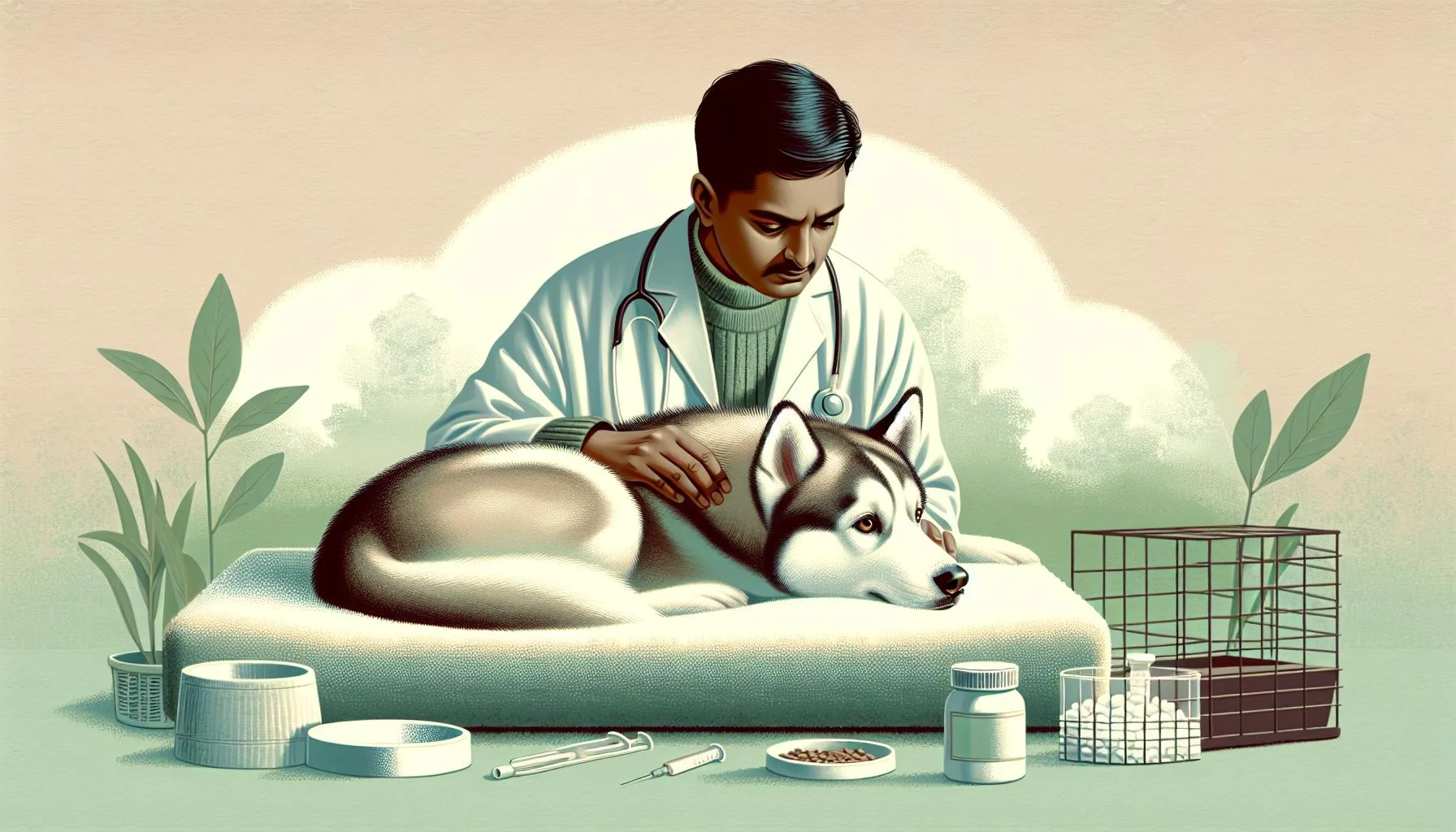
Recognizing the Signs of Stomach Distress
Huskies, like all dogs, are prone to stomach issues, which can manifest in various symptoms. Vomiting is a common sign of stomach distress in Huskies, often caused by dietary indiscretion or gastrointestinal illness.
Additionally, diarrhea is another indicator of stomach problems and can range from mild to severe, sometimes accompanied by blood or mucus. Loss of appetite is a crucial symptom to watch for, as it can signify underlying health issues.
Furthermore, lethargy, or uncharacteristic tiredness, can also be a sign of stomach distress in Huskies. It’s essential for Husky owners to be attentive to these symptoms to promptly address any potential stomach issues and ensure the well-being of their beloved pets.
Husky stomach issues
Owners should monitor their Huskies for symptoms such as vomiting, diarrhea, loss of appetite, and lethargy, which are indicative of stomach distress.
Vomiting can be caused by various factors, while diarrhea can range from mild to severe. Loss of appetite and lethargy are important indicators of potential health issues and should not be overlooked.
If your Husky is experiencing these symptoms, it's crucial to seek advice on managing their condition and improving their health. Explore our comprehensive article, Understanding Your Husky's Winter Coat Shedding, for further insights into their seasonal changes and care requirements.

Impact of Dietary Changes
Sudden dietary changes can have a significant impact on Husky stomach issues. Abruptly switching your husky’s diet can lead to digestive upset, including vomiting, diarrhea, and discomfort.
To avoid such issues, it is essential to make gradual dietary transitions when introducing new food or adjusting portion sizes. This approach allows your Husky’s digestive system to adapt slowly, reducing the likelihood of stomach problems associated with abrupt dietary changes.
Husky stomach issues
By slowly mixing in the new food with the old over a period of several days to weeks, you can help your Husky’s stomach adjust to the new dietary components.
This method minimizes the stress on their digestive system and gives their bodies time to acclimate to the new nutrients.
To ensure your dietary adjustments are as comfortable as possible, embrace the change slowly and with awareness of your body's cues. For insights into canine behavior and understanding aggression, especially in breeds like huskies, delve into our detailed exploration on the dynamics of husky aggression towards smaller dogs.

The Role of Stress in Stomach Issues
Stress plays a significant role in contributing to Husky stomach issues. Huskies, being sensitive and emotional creatures, can experience digestive disturbances when subjected to stressors.
This can manifest as gastrointestinal upset, including vomiting, diarrhea, or loss of appetite. Therefore, it is crucial to provide a stable and calming environment for Huskies to minimize the impact of stress on their digestive system.
Creating a consistent routine, offering mental stimulation, and ensuring a serene living space can greatly aid in reducing stress-induced stomach problems in Huskies.
A stable and predictable daily routine helps alleviate stress for Huskies, providing a sense of security and reassurance. This includes consistent feeding times, regular exercise, and a comfortable sleeping area.
- Introducing interactive toys or engaging activities can help divert a Husky’s attention, reducing anxiety and promoting mental stimulation, which is vital for their overall well-being.
- Furthermore, maintaining a peaceful and harmonious household environment, free from excessive noise or commotion, can significantly lower stress levels for Huskies, thereby supporting their digestive health.
.
To ensure a Husky's well-being and mitigate stress-related digestive issues, providing sufficient exercise is imperative. Discover the exercise needs unique to Huskies and how they contribute to a harmonious lifestyle by visiting Husky Exercise Requirements – Essential Insights for Owners.
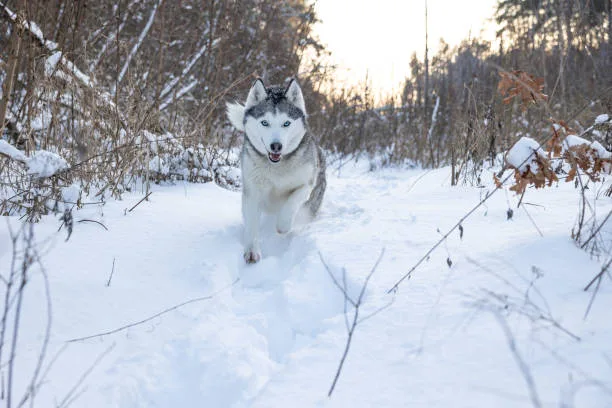
Identifying Food Allergies and Sensitivities
Food allergies and sensitivities can contribute to Husky stomach issues. Common symptoms of food sensitivities in Huskies include vomiting, diarrhea, and skin issues.
To identify these sensitivities, owners can utilize an elimination diet. This involves feeding the Husky a novel protein and carbohydrate source, such as duck and potato, for a specific duration.
Following this, ingredients are gradually reintroduced to observe any adverse reactions. It is crucial to consult a veterinarian before starting an elimination diet to ensure it is conducted effectively.
In some instances, blood tests or intradermal skin testing may be recommended to pinpoint specific allergens. By understanding and addressing food allergies and sensitivities, owners can help alleviate Husky stomach issues and improve their overall well-being..
To gain a deeper understanding of how dietary issues specifically impact Huskies, discover the detailed insights in our comprehensive article, Exploring Digestive Troubles in Huskies. Uncover the steps to take when confronting watery stool in your furry friend and how to transition to a suitable diet.

Importance of Regular Veterinary Check-Ups
Regular veterinary check-ups play a crucial role in maintaining the overall health of your Husky, including the early detection and prevention of Husky stomach issues. These routine visits allow the veterinarian to conduct thorough physical examinations and discuss any concerns related to your Husky’s stomach health.
Additionally, veterinarians can provide valuable guidance on proper nutrition, feeding practices, and dietary adjustments tailored to your Husky’s specific needs. Through regular check-ups, potential stomach issues can be identified early, enabling prompt intervention and treatment to ensure your Husky’s gastrointestinal health is well-maintained.
It is advised to follow the recommended schedule of check-ups to stay proactive and address any emerging concerns before they escalate into more serious Husky stomach issues. Regular vet visits also offer the opportunity to discuss preventive measures and dietary strategies that can contribute to maintaining a healthy digestive system for your beloved Husky..
Regular veterinary check-ups play a pivotal role in the well-being of your Husky, ensuring early detection and management of potential stomach issues. To discover more about the vibrant world of Red Huskies, including their value and care, delve into our detailed article on the cost and considerations for a Red Husky.

Probiotics and Digestive Supplements
Probiotics and digestive supplements play a vital role in maintaining a Husky’s digestive health. Incorporating probiotics into a Husky’s diet can help in promoting the growth of beneficial gut bacteria, which in turn aids in digestion and nutrient absorption.
These supplements can be particularly beneficial for Huskies prone to stomach issues, as they help in restoring the natural balance of the digestive system. Additionally, digestive supplements such as enzymes can assist in breaking down food more efficiently, reducing the likelihood of stomach upset and discomfort for Huskies.
By including probiotics and digestive supplements in their regimen, Husky owners can take proactive steps to support their pet’s gastrointestinal well-being and minimize the occurrence of Husky stomach issues.
American Kennel Club: Husky stomach issues
When it comes to Husky stomach issues, probiotics and digestive supplements offer a natural way to enhance digestion and prevent gastrointestinal disturbances. These supplements can be particularly beneficial for Huskies prone to stomach issues, as they help in restoring the natural balance of the digestive system.
Discover more about ensuring the well-being of your Husky and managing their behavior effectively by exploring our comprehensive guide on managing Siberian Husky dominance and biting issues. Transition to a tailored approach in nurturing your pet's health and temperament with our expert insights.

Managing Acute Stomach Issues at Home
If your Husky experiences acute stomach issues at home, there are steps you can take to provide immediate care before seeking professional veterinary assistance. It’s crucial to carefully observe your dog’s symptoms, including vomiting, diarrhea, and discomfort, before taking action.
Firstly, ensure that your Husky has access to fresh water at all times to prevent dehydration, especially if there is diarrhea or vomiting. Additionally, temporarily withhold food for 12-24 hours to give the stomach a chance to settle, and then gradually reintroduce a bland diet consisting of boiled rice and chicken in small, frequent portions.
This can help soothe the digestive system and provide essential nutrients. Monitoring your husky closely for any signs of improvement or deterioration is important during this period.
If the symptoms persist or worsen, seeking veterinary care promptly is essential to address the root cause of the stomach issues. Remember, while managing acute stomach issues at home, seeking professional guidance is always the best course of action to ensure your Husky’s well-being..
To learn more about interpreting your Husky's body language, specifically concerning ear positioning and what it may indicate about their health and emotions, delve into our comprehensive article, 'Understanding Your Husky's Ear Signals: A Complete Guide'. This resource offers valuable insights into canine communication cues and how they relate to your furry friend's well-being.

When to Seek Emergency Vet Care
If your Husky experiences severe stomach issues, it’s crucial to recognize the signs that necessitate emergency veterinary care. Symptoms such as persistent vomiting, especially if it contains blood or is accompanied by severe diarrhea, warrant immediate attention.
Additionally, if your Husky appears to be in significant discomfort, is unable to rest comfortably, or shows signs of abdominal bloating or distension, it’s essential to seek emergency veterinary care promptly. These symptoms could indicate serious conditions like gastric torsion or intestinal blockages, which can be life-threatening if not treated urgently.
Remember, swift action in such critical situations can make a substantial difference in your Husky’s health and well-being.
On Quora about: Husky stomach issues
Always keep in mind that Husky stomach issues accompanied by severe symptoms like persistent vomiting, diarrhea with blood, abdominal bloating, or signs of extreme discomfort necessitate immediate veterinary attention to ensure the best possible outcome for your pet.
Recognizing when your Husky needs emergency care is crucial for their health and well-being. For further guidance on how to support your pet's needs, explore the insightful article on Top Knee Braces for Chihuahuas, which can offer valuable advice for your smaller canine companions.

Preventive Measures for Stomach Health
To prevent Husky stomach issues, regular deworming, maintaining a proper diet, and minimizing stress are essential. Deworming is crucial to eliminate intestinal parasites that can cause digestive distress in Huskies.
It’s important to consult with a veterinarian to establish a deworming schedule tailored to your Husky’s needs. A well-balanced diet is key to promoting stomach health.
Ensure the diet comprises the right mix of proteins, fats, and carbohydrates. Additionally, gradual dietary transitions can help avoid stomach problems that may arise from sudden dietary changes.
Stress management is equally important. Huskies are sensitive to stress, which can impact their digestive system.
Creating a stable and comfortable environment can help minimize stress-related stomach issues. Regular exercise, mental stimulation, and a consistent routine can contribute to reducing stress levels for your Husky..
To discover more about keeping your furry friend healthy and happy, explore our comprehensive guide on miniature golden retrievers. Embrace the journey of companionship with your new best friend by visiting Miniature Golden Retriever: Adopt Your New Best Friend!
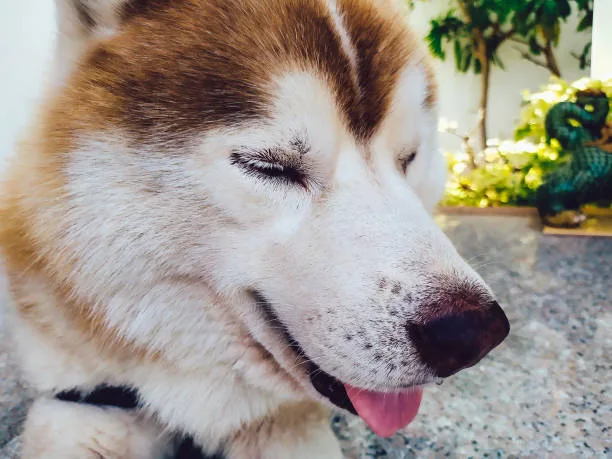
Feeding Practices for Sensitive Husky Stomachs
Huskies are known for their sensitive stomachs, which require careful attention when it comes to feeding. It’s vital to opt for dog food formulas specifically tailored for sensitive Husky stomachs.
Look for options that are free from common allergens such as wheat, soy, and corn, as well as artificial additives and preservatives. Additionally, prioritize easily digestible protein sources like chicken or lamb, and complex carbohydrates such as sweet potatoes or brown rice.
When selecting dog food for a sensitive Husky stomach, consider options with added probiotics and digestive enzymes to support healthy digestion. Gradually transitioning to new food and ensuring a consistent feeding schedule can also help manage stomach sensitivity in Huskies.
Remember to monitor your Husky’s reaction to different foods and consult with your veterinarian to determine the most suitable feeding practices for their sensitive stomach. Always provide access to clean water and avoid overfeeding, which can exacerbate Husky stomach issues.
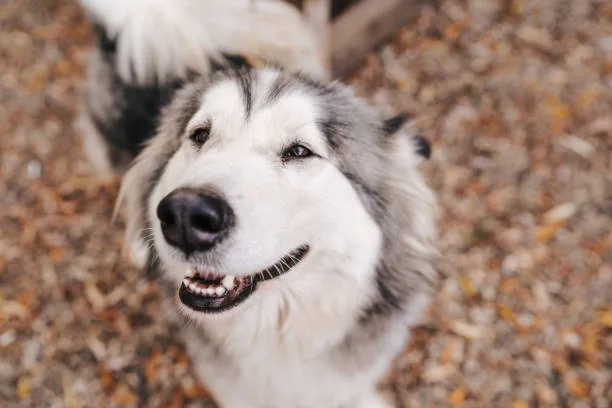
Customizing Husky Nutrition: Tailored Diets to Prevent Common Health Issues
To ensure optimal health for your Husky, it’s crucial to provide a customized diet that meets their specific nutritional requirements. This tailored approach plays a key role in preventing common health issues such as obesity, digestive problems, and pancreatitis.
Balancing commercial and homemade food allows for a diverse nutrient intake, while incorporating protein sources tailored to high-energy breeds can support the Husky’s active lifestyle. Additionally, establishing and maintaining a consistent feeding schedule not only helps manage weight but also promotes digestive health.
By focusing on personalized nutrition, you can proactively safeguard your Husky against a range of potential health concerns. Husky stomach issues.
Customizing your Husky’s nutrition is the cornerstone of preventing common health issues, including obesity and digestive problems.
By carefully curating a combination of commercial and homemade food, you can ensure a well-rounded nutrient intake for your Husky.
Protein plays a crucial role in your Husky’s diet, especially when tailored to their high-energy needs. This targeted approach to nutrition not only supports their active lifestyle but also contributes to overall health and vitality.
Establishing a consistent feeding schedule is vital for managing your Husky’s weight and promoting digestive health.
This structured approach to mealtimes can help prevent stomach issues and maintain their well-being over the long term.
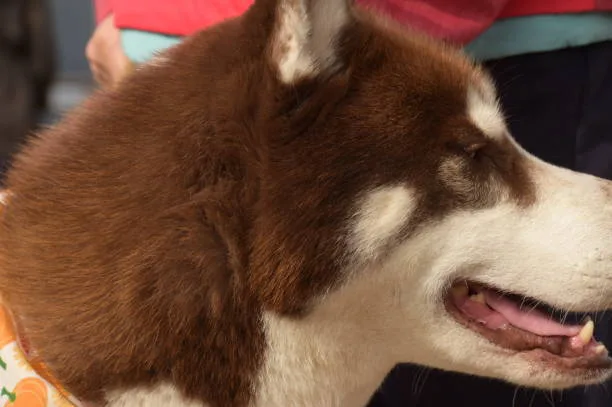
Advancements in Husky Dietary Research: Specialized Foods and Supplements
Recent advancements in specialized dog food formulas and supplements for Huskies have revolutionized the approach to maintaining their gastrointestinal health. Husky-specific dog food now offers tailored benefits to address the breed’s unique needs, such as high energy levels and potential digestive sensitivities.
These specialized formulas incorporate essential nutrients and ingredients to support overall digestive function and promote a healthy weight. Additionally, supplements like probiotics and fiber play a crucial role in enhancing Husky gastrointestinal health.
However, it’s important to weigh the pros and cons of grain-free and raw diets when considering dietary options for Huskies. While these diets may offer certain benefits, hydration and the avoidance of toxic foods are paramount considerations for Huskies, ensuring their well-being and digestive wellness..

Monitoring and Managing Husky Gastrointestinal Sensitivities
Huskies are prone to gastrointestinal sensitivities, including food allergies, inflammatory bowel disease, and food intolerances. It’s vital to recognize the symptoms of upset stomachs in Huskies, such as vomiting, diarrhea, and flatulence.
To manage these sensitivities, one approach is to formulate an elimination diet. This involves identifying potential trigger foods by eliminating certain ingredients from the Husky’s diet and then gradually reintroducing them while monitoring for adverse reactions.
Additionally, rotational feeding can help minimize the potential for allergens and intolerance development. This feeding method involves varying the Husky’s diet by introducing different protein and carbohydrate sources at regular intervals.
By implementing these strategies, owners can effectively monitor and manage the gastrointestinal sensitivities of their Huskies..

Prevention Strategies for Husky Digestive Health
Huskies are prone to stomach issues, and prevention is key to their digestive health. To prevent Husky stomach issues, it’s essential to focus on Husky bloat prevention.
This involves feeding them smaller, more frequent meals, and limiting vigorous exercise after mealtimes to reduce the risk of bloat. Additionally, maintaining a consistent feeding schedule is crucial for their digestive well-being.
Ensuring that Huskies are fed at the same times every day helps regulate their digestive systems and prevents stomach upsets. Moreover, regular exercise plays a vital role in maintaining their digestive health.
Daily activity aids in keeping their gastrointestinal functions smooth and stable. Portion control is equally important in preventing digestive issues.
Huskies should be fed appropriate quantities of food to avoid overeating, which can lead to stomach discomfort and other health problems. Lastly, consistent veterinary care is essential in keeping Huskies’ overall health in check, including their digestive health.
Regular check-ups with the vet can help identify and address any potential stomach issues early on, ensuring that Huskies stay happy and healthy for years to come..
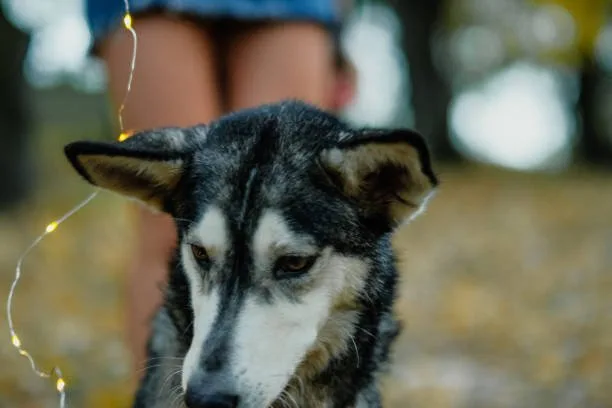
Conclusion: Maintaining Your Husky's Stomach Health
Maintaining your Husky’s stomach health is crucial to their overall well-being. By staying aware of their dietary needs and proactively managing their diet and health, you can effectively prevent Husky stomach issues.
This includes providing a balanced diet with the right mix of proteins, fats, and carbohydrates. Additionally, gradual dietary transitions should be made to avoid sudden changes that could lead to stomach problems.
Regular veterinary check-ups are also essential to identify and address any potential stomach issues early on. By incorporating these preventative measures into your Husky’s care routine, you can help ensure that they maintain optimal stomach health and overall vitality..

Leave a Reply